WEBINAR: Hear from leaders of corporate citizenship programs on how they define the factors causing food insecurity and the programs they have created to address food disparities.
Companies with Supplier Diversity Programs Talk Purpose, Strategy

Supplier diversity programs are gaining traction. Between 2020 and 2022, America’s 200 largest public companies announced plans to spend roughly $50 billion with diverse suppliers before 2030. That’s good news for the countless small and mid-market U.S. businesses owned by minorities, women, veterans, LGBTQ+ individuals, and people with disabilities. It also represents just 4% of the untapped revenue potential of these companies, which could be worth as much to the economy as $1.3 trillion annually.
But it’s not just these diverse suppliers who stand to gain. Strides made toward inclusive procurement have supported economic opportunities for underrepresented communities nationwide. According to The National Minority Supplier Development Council (NMSDC), minority-owned enterprises now generate $400 billion in economic output and have supported the creation or preservation of 2.2 million jobs. Supplier diversity initiatives often kickstart a virtuous cycle of societal wins: generating jobs; amplifying stimulus to diverse communities; narrowing longstanding gaps in wealth, healthcare access, and technology access—all of which ultimately creates more opportunities for more diverse suppliers to refuel the cycle. In effect, it’s positive impact cascading through the supply chain.
Still, inclusive procurement is not without challenges. A host of questions—old and newly arising—threaten to stall market progress. Both for companies off and running, and for those yet to get started, these can include:
- What is the business case for investing in supplier diversity?
- Where should companies start in launching supplier diversity programs?
- How do companies with supplier diversity programs find and grow relationships with more diverse suppliers?
- How will the Supreme Court’s ruling on affirmative action affect companies with supplier diversity programs?
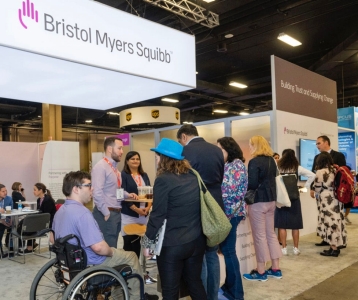
We spoke with the supplier diversity teams at Bristol Myers Squibb (BMS), Accenture, and MGM Resorts International (MGMRI)—three companies with robust supplier diversity programs—to explore these questions and more. But first, a bit of context on the subject:
What is supplier diversity?
Supplier diversity is the active and intentional effort of a company to include small and diverse businesses in their procurement of goods and services. In the U.S., diverse businesses include those that are at least 51% owned and operated by a group that is traditionally underrepresented in the marketplace: women, minorities, LGBTQ+ individuals, disabled individuals, military veterans, disabled veterans, or owners from economically-disadvantaged groups, to name a few. This definition changes across countries due to local laws and regulations.
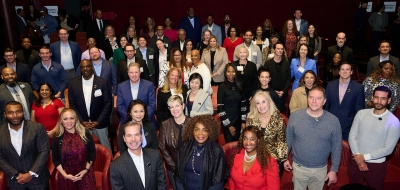
How do corporations tap into verified diverse suppliers?
A variety of third-party organizations exist to help businesses acquire and maintain nationally (or, in some cases, globally) recognized certification. The list below includes some well-known certification bodies, as well as advocacy groups, in the U.S. and abroad. Some businesses are certified in more than one diversity category. Before agreeing to work together, many companies may require diverse suppliers to obtain certification from a body like one of those listed below. Some companies, but certainly not all, may also require suppliers to register in their own online supplier portal.
- Canadian Aboriginal & Minority Supplier Council (CAMSC)
- Canada’s 2SLGBTQI+ Chamber of Commerce (CGLCC)
- Disability:IN
- Diversity Alliance for Science (DA4S)
- Global Supplier Diversity Alliance (GSDA)
- HUBZone Contractors National Council
- Minority Supplier Development of UK (MSDUK)
- National LGBT Chamber of Commerce (NGLCC) and Affiliates
- National Minority Supplier Development Council (NMSDC) and Affiliates
- National Veteran Business Development Council (NVBDC)
- National Veteran-Owned Business Association (NaVOBA)
- National Veterans Small Business Engagement (NVSBE)
- System for Award Management (SAM)
- United States Black Chamber of Commerce
- United States Hispanic Chamber of Commerce (USHCC)
- United States Pan Asian American Chamber of Commerce (USPAACC)
- United States Veteran Business Alliance
- Veterans in Business Network (VIB)
- WEConnect International
- Women Impacting Public Policy (WIPP)
- Women’s Business Enterprise National Council (WBENC) and affiliates

Are small businesses considered diverse suppliers?
Some companies, like Bristol Myers Squibb, do include small and local businesses in their supplier diversity initiatives, or otherwise maintain separate programs that prioritize small-business enterprises (SBEs). These companies typically require suppliers to be certified and within the applicable small business-size standards as defined by the Small Business Administration’s (SBA) 8(a) program. Other companies, like Nike, expressly state that “small business” is not a diversity category on its own.
At the end of the day, supplier diversity is about opening doors for business leaders who have historically lacked access to wealth or opportunities. From some perspectives, this can include small businesses which are not dominant in their area of the market. It can also include businesses based in historically underutilized business (HUB) zones.

What’s the difference between Tier 1 and Tier 2 (Second Tier) supplier diversity?
Tier 1 diverse suppliers are those that sell directly to your company. Tier 2 suppliers are those that sell to a company’s suppliers (including subcontractors), perhaps at the request or encouragement of your procurement team. Companies leading the way on supplier diversity may even require their contractors to build diversity in their own vendor relationships and report back on their progress. Supplier diversity goals may require tracking direct and indirect spending at both tiers. Typically, some form of supplier diversity software is required to manage this amount of data, which quickly becomes outdated. You can read more on supplier diversity software below.
Why is supplier diversity necessary? Why should companies care about inclusive procurement?
For companies with stated values regarding equity and economic inclusion, supplier diversity is an important part of practicing what you preach. According to the CEO of the Black Innovation Alliance Dr. Kelly Burton, only about 10% of corporate spending was done with disadvantaged groups in 2021, which means the amount of spending done with businesses led and owned by people of color tended to hover in the single digits.
“So, for corporate America, [it was] less than 5%... which is abysmal when we consider the fact that people of color make up 39% of the U.S. population,” Dr. Burton said in a Marketplace interview.
Research also shows that minority- and women-owned business enterprises (MWBEs) tend to hire more minorities and pay them higher wages, on average, as compared to the competition. Consequently, there’s a broader social impact case to be made for supporting them. An analysis published on Allstate’s IDE page outlines, “$1 spent with Allstate’s diverse suppliers drives $1.80 in total economic production. This means the economic impact of Allstate’s purchases with diverse-owned suppliers in 2022 is estimated at over $694 million, which supports jobs, [wages, and benefits] within that supply chain and the communities where those businesses operate.”
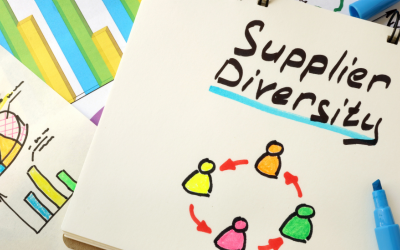
Diverse procurement practices are also profitable in addition to combatting social injustice. Broadening the supply chain ramps up competition, which in turn cuts costs and improves quality, according to Accenture. Small, diverse businesses tend to be more innovative and agile than their competitors. They also open to the door to fresh perspectives, which contracting companies can leverage and build on. All in all, companies with diverse supplier bases generate a 133% greater return on procurement investments than those without.
Finally, stakeholders care about what’s going on behind the scenes. Increasingly, consumers and employees are asking questions about what companies stand for when it comes to social issues. Supporting supplier diversity could help companies retain top talent—especially younger employees, who report a strong connection between personal values and company loyalty. Deloitte recently found that 51% of millennial workers who are dissatisfied with their employers’ social impact efforts intend to leave their roles within two years. By contrast, 53% of those who are “very satisfied” on the same score intend to stay beyond five years.
For supplier diversity leaders like those at Bristol Myers Squibb, the business case has long been clear.
“Our mission at [Bristol Myers Squibb] is to transform patients’ lives through science,” explained Rondu Vincent, executive director, global supplier diversity & sustainability. “[Our] small business and diverse supplier program has made BMS more competitive in the marketplace. It has made us a more inclusive and open-minded company and a more attractive place for the best and the brightest to build their careers. Small and diverse suppliers are often agile, more cost-effective and bring a different perspective. That helps us improve our own efficiencies, drive innovation, understand challenges, and grow our workforce representation. Championing diversity internally within Bristol Myers Squibb and externally through our suppliers ultimately helps us better understand our patients and their communities.”

Where did the concept of supplier diversity originate? Where does it stand today?
The Civil Rights movement of the 1950s and 1960s resulted in some important legislation and anti-discrimination initiatives, which allowed more minority-owned businesses to participate in the marketplace. For a thorough overview, the Detroit Regional Chamber offers a decade-by-decade timeline of key events for minority-owned small businesses and suppliers. These include the establishment of different acts and associations that earmarked percentages of federal contracting dollars to diverse businesses or else expanded support for them via grants, capital, and guidance.
A heightened focus on supplier diversity—including support for small, local businesses—became advisable, if not necessary, during and after the COVID-19 pandemic. In 2020, many companies were grappling with supply chain issues. Protests surrounding the murder of George Floyd and pervasive racial injustice were rampant. Small business owners were suffering from a variety of challenges: curtailed service abilities, forced closures, limited cash reserves, etc. Amidst this perfect storm, more companies—even those without dedicated procurement teams or technology—began exploring supplier diversity programs both as a smart business practice and an essential element of community involvement.
Read how companies like Nielsen and Fiserv promoted diverse small businesses—offering financial support, pro bono hours, mentoring, technology, increased diversity spend goals, and other resources—in the wake of a health crisis that disproportionately affected this group.
Today, the market continues to build on this progress. Companies of all stripes are looking beyond what’s required by the government or other compliance-minded entities in order to create a diverse procurement strategy that aligns with their overall business goals and values—especially diversity, equity, and inclusion values.
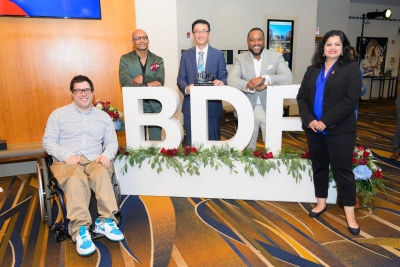
Are supplier diversity programs at risk following the Supreme Court’s 2023 ruling on affirmative action?
Many companies continue to maintain aspirational goals related to spending with small and diverse suppliers. Bristol Myers Squibb, for example, aspires to continue to annually spend $1 billion across the globe with small and diverse-owned suppliers through 2025 and be part of the Billion Dollar Roundtable. (The Billion Dollar Roundtable is a non-profit organization that comprises U.S. corporations that each spend $1 billion or more annually on a Tier 1 basis with diverse suppliers.) Target reports it is “on track to meet [its] goal of spending more than $2 billion with Black-owned businesses by the end of 2025.” JetBlue says it has “pledged to grow addressable spend with verified underrepresented or underserved businesses by 5% year over year, and require all competitive purchasing processes to include at least one certified-diverse business in the selection process, whenever possible.”
But the jury is still out on what exactly the future holds. “Supplier diversity programs may present greater risks after SFFA,” report partners from Seyfarth. “Although affirmative action plans are clearly permissible under Section 1981 in some circumstances (e.g., employment and education), there is no guarantee courts will follow that same approach in the supplier contracting context. Moreover, courts’ long history of scrutinizing such programs in the public sector may now bleed over into Section 1981 challenges to private entities’ supplier diversity initiatives.”
Some companies are changing the way they talk about diversity, equity, and inclusion (DEI) even while their commitments and strategy remain the same.
Still, many leaders remain focused on the positive.
“Let’s focus on the jobs and economic impact supplier diversity brings to the communities,” said Nedra Dickson, managing director, global supplier inclusion & diversity—supply chain, Accenture. “With so much disruption in the supplier chain, small and diverse-owned businesses are needed more than ever. Focus on the value add and not the negative.”
Why are supplier diversity programs important to the future workforce?
As the job landscape evolves with advancing AI and automation capabilities, many workers will need to find new roles. Disproportionately, those affected may be minorities, as Black and Latino workers are overrepresented in 11 and 13, respectively, out of the 30 jobs employing the most U.S. workers at “high risk” of being “significantly changed or eliminated” due to automation. Here again, more investment in MWBEs could help catalyze job opportunities for the people most likely to need them.
Working with lawmakers to protect the interests of small and diverse suppliers
“We keep state and federal policymakers informed on policy issues important to Bristol Myers Squibb and our partners via our Policymaker Engagement initiative, which brings our internal government affairs team together with external advocacy organizations such as Women Impacting Public Policy (WIPP), WBENC, NGLCC, and Disability:IN,” said Tarrance Frierson, director, global supplier diversity at Bristol Myers Squibb.
“Also, we’ve taken small and diverse suppliers to lawmakers on Capitol Hill to discuss legislation and issues of importance to them. We supported an executive order making Hoboken/Jersey City the first area in the state [of New Jersey] to promote city contracts with LGBT, veteran, and disabled business owners. We have met with the members of a groundbreaking state commission tasked with driving statewide (New Jersey and Pennsylvania as pilot programs) equality efforts around the LGBTQ+ community. And we continue engaging with state government in New Jersey to promote supplier diversity… through support of bills and initiatives.”
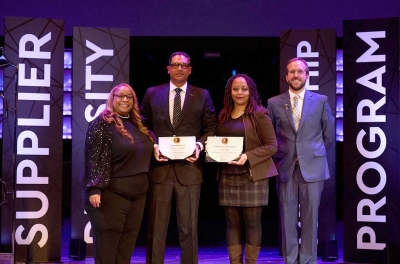
Company Example: How MGM Resorts International built its supplier diversity program
For MGM Resorts International (MGMRI), the process began almost 25 years ago, when MGM Mirage declared diversity a critical business imperative. MGM Resorts International is a global entertainment company with national and international locations featuring hotels and casinos, meeting and conference spaces, live and theatrical entertainment experiences, and an extensive array of restaurant, nightlife, and retail offerings. Best known for its entertainment offerings, MGM Resorts International also has a longstanding commitment to incorporating business diversity in both its workforce and its supply chain (see timeline below).
In 2021, MGM’s Supplier Inclusion Task Force was formed to foster a more inclusive response to procurement across the company. Comprised of 15 cross-functional senior executives, the task force identifies and removes barriers to doing business with MGM Resorts International, while evaluating strategies, goals, and metrics that benefit not just diverse businesses but all business who support MGM Resorts International.
The company’s supplier inclusion program extends competitive opportunities to local and diverse-owned businesses, aiming to have a transformative impact on the economies of local and diverse communities. At present, MGM Resorts International is on track to achieve its 2025 goal of spending 15% of biddable procurement with diverse suppliers.
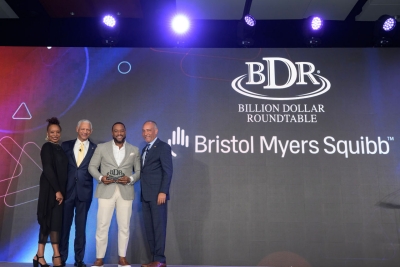
Company Example: Bristol Myers Squibb on the history and makeup of its supplier diversity program
Bristol Myers Squibb began its supplier diversity program 28 years ago in response to social responsibility and to comply with requirements for government contractors. Since then, the company has embraced the program as a business strategy and an enterprise-wide shared objective that ensures a diverse supplier base in the procurement of goods and services for all functions.
“At Bristol Myers Squibb, supplier diversity is about people,” said Jonathan Harmatz, manager, supplier diversity & sustainability. “We believe in Partnering with Purpose, building relationships rooted in trust. We want our connections to be transformative. We do that by sharing resources, broadening perspectives, increasing efficiencies, and transforming lives. The goal is to champion economic empowerment through wealth and job creation in the community while fostering inclusive innovation and a supply chain that reflects our values, our patients, and our world.”
The company’s procurement department includes a dedicated supplier diversity team that has grown with this evolution and is responsible for all internal and external supplier diversity and small business operations, community outreach, and strategic procurement alignment. Today, the supplier program is a companywide effort, and each leader is encouraged to consider small and diverse suppliers in the procurement process.
Want more examples of companies with supplier diversity programs or how they work?
Just ask us. We're happy to provide a free report via our Knowledge Request service for BCCCC members.
Going global with supplier diversity
For companies with a global presence, supplier diversity becomes a larger undertaking. Not only is diversity perceived differently in different countries, laws and guidelines differ significantly, and new sets of partners and diversity champions need to be engaged.
“By expanding our Global Supplier Diversity Program, we are moving the supplier diversity footprint beyond the borders of the United States, to other nations, including regions in LATAM, UK and Ireland, Europe, and APAC,” said Sundari Pai, senior manager, global supplier diversity at Bristol Myers Squibb. “We’ve added more champions in global markets, both with new suppliers and global advocacy organizations like MSDUK and WEConnect International. In addition, we are engaging with global BMS colleagues, focusing on the value of supplier diversity to the business, to the community, and to our company’s culture.”
How do you find diverse suppliers?
For the team at Bristol Myers Squibb, this aspect of business is personal.
“We are not simply seeking small and diverse suppliers using tools and management systems,” said Pai. “We believe in developing relationships. This is where our philosophy of Partnering with Purpose and building trust comes into play. We work with a variety of advocacy partners, peer groups to actively seek out small and diverse suppliers, whether on an international scale or a hyper-local one. Our supplier diversity team regularly attends relevant conferences and recently created an innovative conference engagement approach to match with our Book of Work, creating relationships and hearing pitches that have led to innovative, inclusive, and intentional partnerships.”
How can companies help retain diverse suppliers?
In order to maintain a pool of thriving small and diverse suppliers, many companies now offer mentoring as form of vendor services. MGM Resorts International is one such company.
“MGM Resorts empowers and uplifts small and diverse-owned businesses, investing in them through the MGM Resorts Supplier Diversity Mentorship program,” said Kenyatta Lewis, executive director of supplier inclusion, sustainable procurement & training at MGM Resorts International. “This focused strategy pairs diverse-owned business leaders from various industries with MGM Resorts International Resorts executives, empowering them with the tools and knowledge needed to thrive in the global supply chain.”
The eight-month program consists of operational enrichment workshops that build supplier capabilities across seven defined pillars, with a goal of addressing critical business development gaps. Aside from refining business acumen, mentees cultivate lasting relationships with the company, community partners and other certified diverse-owned businesses, well beyond the eight months of the actual program.
The program’s success has surpassed expectations, and the original goal of graduating 50 diverse-owned businesses by 2025 has tripled to 150. In mid-January, during National Mentorship Month, 38 diverse-owned businesses graduated in the largest class to date. One participant shared the following:
“We have gone from learning how to set and implement our own standards, to setting industry standards with the training opportunities we received through their Supplier Diversity Mentorship Program. Our team received expert coaching to help bring this company to the next level. Our community is better because we have great jobs with flexible shifts to offer our neighbors. We have been able to increase our capabilities during the most difficult economical periods in recent history. I’m confident our success is attributed to the support provided by MGMRI’s Supplier Diversity Mentorship Program.”
–Rebeca Merigian, Park Cleaners, Inc., Springfield, MA , Class of 2020
Since 2016, the program has impacted 105 diverse-owned businesses representing 19 states. Of those 63 suppliers, 80% have experienced growth in their business with MGM Resorts International.
“Impressively,16 alumni [served as part of] the Super Bowl Host Committee for Super Bowl LVIII in Las Vegas. Selected businesses [were] profiled in the Super Bowl LVIII Business Connect Resource Guide, one of the main resources NFL vendors and event producers use to identify qualified and experienced providers of required goods and services,” Lewis said.
Mentoring diverse suppliers to build relationships and trust
Helping suppliers succeed and grow their businesses is a smart way to build trust and lay the foundation for a lasting relationship. And while that used to mean bringing suppliers up to speed on tools like social media or—more recently—cyber security, Accenture’s Nedra Dickson, managing director, global supplier inclusion & diversity—supply chain, says artificial intelligence (AI) is the current must-have for supporting the growth of small and diverse businesses. “AI should be used to enhance the way we work and deliver work,” Dickson said.
Accenture launched its Diverse Supplier Development Program (DSDP) in 2006. The program currently involves 18 months of training and one-on-one mentoring, and has expanded to include partnerships in Australia, Canada, India, South Africa, the United Kingdom, Ireland, and the U.S. The company also offers participants quarterly symposiums on topics such as marketing, social media, sales, business development, cybersecurity, legal, and storytelling. In FY21, Accenture set a goal to graduate 250 diverse suppliers by the end of fiscal year 2023. As of November 2023, 256 suppliers had graduated.
“We codeveloped a digital platform with one of our Black-owned businesses in South Africa,” said Dickson “The digital asset enables the efficient delivery of DSDP programs; it facilitates easy interaction between small and diverse-owned businesses and Accenture. “It supports the suppliers through the entire DSDP cycle with an automated application selection process, business health assessment for targeted development, business tools, and commercial opportunities. DSDP mentees demonstrate their progress by completing business health assessments and quarterly progress reports throughout the duration of the program. We are still working with suppliers that graduated in our first program in 2006.”
Through mentoring and scholarships, Bristol Myers Squibb’s Supplier Development workstream also invests in the long-term growth of small and diverse businesses. The company recently conducted an intensive 18-week program with 10 of its suppliers from Puerto Rico, providing a Lean Six-Sigma training course that taught problem-solving methodologies focused on quality and speed, and provided the analytical tools needed to implement those methodologies. Bristol Myers Squibb also sponsors multiple small and diverse global suppliers on a yearly basis to the Tuck School of Business for Diverse Businesses at Dartmouth University and a residential program at Aston Business School in the UK.
How should companies promote their supplier diversity efforts and wins to stakeholders?
MGMRI uses its social platforms, company website, annual Social Impact & Sustainability Report, new hire onboarding, internal ‘roadshow presentations,’ and executive ambassadors who integrate supplier inclusion into their daily business strategy to promote its supplier diversity initiatives. The company also leverages a diverse spend tracker that shows impact by business unit/center of excellence.
Bristol Myers Squibb brings its supplier diversity efforts to the forefront via Bristol Myers Squibb People and Business Resource Groups (PBRGs). These groups understand the positive effect a diverse supply chain has on the community at large, and they champion diversity inside and outside the company. Accordingly, Bristol Myers Squibb’s supplier diversity team actively works with eight PBRGs to execute its business plan relating to small and diverse suppliers. A recent success of supplier diversity’s partnership with the Pride Alliance PBRG involved hosting the New Jersey State Chamber of Commerce’s inaugural supplier diversity summit at Bristol Myers Squibb’s Princeton Pike headquarters.
Using technology to improve supplier diversity strategies
An estimated 23% of supplier diversity data changes each year. Procurement needs to stay on top of the changes, while avoiding the risk of over- or under-reporting diversity data. When asked how they manage supplier diversity data, MGM Resorts International shared that it employs an internally designed “Diversity Spend Impact Tracker” using business intelligence (BI) tools to capture each business unit and individual department contribution to the overall company impact goal.
“Data is refreshed monthly and provides a snapshot of spending trends,” said Lewis. “This BI tool is also used for all impact reporting in regional regulated markets. Meanwhile, supplier Inclusion leverages Supplier.io to manage supplier listings, status and second-tier diversity impact reporting.”
How to set supplier diversity goals and measure outcomes
When it comes to setting and measuring supplier diversity goals, Accenture’s Dickson recommends looking beyond spend. Results can also come in the form of number of jobs created, number of new technologies designed by suppliers, or even the instances of community service paid forward by the small and diverse companies in your supply chain.
Indeed, building on this culture of inclusivity is so fundamental—and offers such a clear competitive advantage—it is now tied to MGM Resorts International C-suite goals—to the line level.
“It’s more than just procurement spend,” said MGMRI's Lewis. “[We] engage diverse suppliers in all aspects of [the] business—including treasury, investor relations, and legal… We measure economic impact to communities and track the number of jobs created as a result of engaging a diverse supply base.”
“We’ve developed best-in-class tools to present the data that helps executives see the impact of the supplier diversity program. Bristol Myers Squibb’s induction into the Billion Dollar Roundtable in 2023 speaks for itself in terms of results and success,” said Ethan Chen, senior manager, data analytics.
“However, we also do more than measure results,” said Chen. "We create community impact that leads to results. Our Power2Impact program connects directly with the communities we serve, especially those that are economically disadvantaged, underserved, and underrepresented. We’ve conducted clothing drives, sponsored resume-writing classes, and donated care packages to school children in need. These activities make a lasting effect on communities and increase our impact locally and internationally. We advise companies considering an expansion of their diversity efforts to look beyond mere spend. The value is found in the solutions we receive and in the impact we make in the communities where we live, work, and serve, and—in our case—for our patients.”
Bristol Myers Squibb also uses strategic category management to connect small and diverse businesses with new and traditional procurement opportunities, including invitations to attend conferences and events. This includes an annual aspirational goal planning activity, as well as innovative activations at conferences and events. The team also continues to work with the Business Insights and Analytics team (BI&A) on multi-year aspirational goal planning, as well as taxonomy translation, and an economic impact report to measure the impact of Bristol Myers Squibb’s spend and more.
Do you need help measuring the impact of your corporate social responsibility programs?
What about determining ideal goals, outcomes, and metrics in the first place? BCCCC has an online, self-paced course for that. Learn more about Corporate Citizenship Impact Measurement & Evaluation.
Related Content
This meetup explored two different philanthropic approaches: company-led and foundation-led corporate giving. Our speakers shared insights from their experiences, highlighting the pros and cons of both models.
WEBINAR: This research unpacks 2024 data on the roles, responsibilities, development, and compensation of people working in your field. The findings provide insight into how professionals at all levels assess the skills they need to be effective, and what they perceive as the greatest challenges they must overcome.
Profile of the Professionals reports provide insight into how professionals at all levels assess the skills they need to be effective in their roles. This report focuses on the energy industry.

.jpg)






